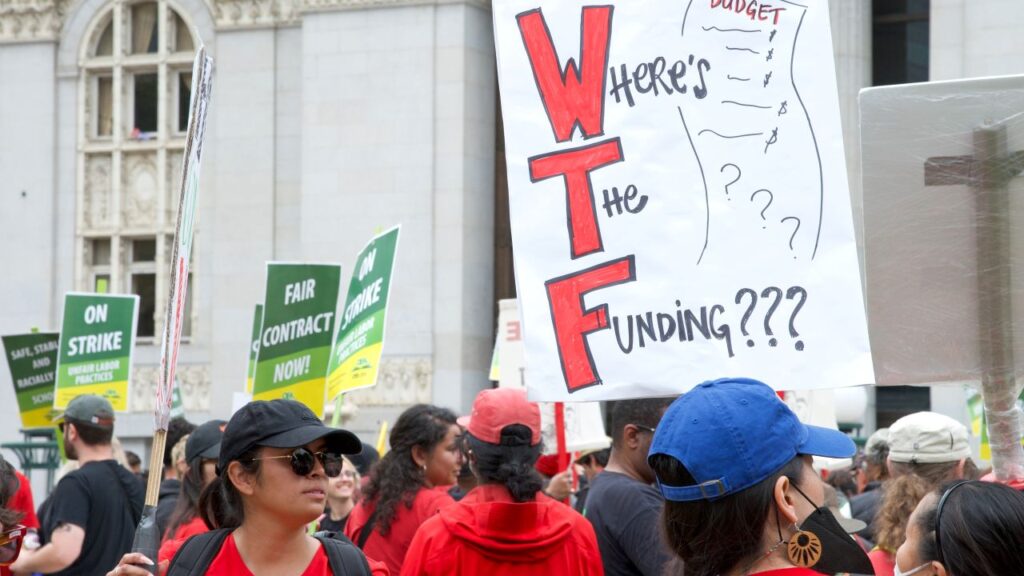Share
After handing unions a brightly wrapped gift in 2019 with Assembly Bill 5, Assemblywoman Lorena Gonzalez is putting the bow on another present, Assembly Bill 314, which would allow legislative staffers to organize. Had she first asked a legendary labor leader what he thought about it, she would have likely received a response she didn’t want to hear.
AB 314, the San Diego Democrat’s third attempt to open the door for legislative staff unionization, promises job security for staffers, and would provide, according to Gonzalez’s office, “workplace protections laws that cover employees in private and public employment.”
“Every other employee in the state has the right to organize their workplace and join a union if they choose – legislative staff should be no different,” Gonzalez said.
Sounds fair enough. But opinions vary.

Kerry Jackson
Opinion
Differences with Private Sector Bargaining
Some, such as PRI’s director of communications and former legislative staffer, see the legislation as a naked effort to generate “more members and more dues for public employee unions.” Others believe government employees simply should not be allowed to organize. Their reasoning is clear: unlike collective bargaining in the private sector, in which there are opposing sides, negotiations between public-sector workers and their employers are one-way affairs.
In the private sector, management’s interest and unions’ interests are not the same. But when public-sector employees and governments talk, there is no counter argument coming from the other side of the table. Elected officials are duty-bound to represent the interests of taxpayers, yet when public employees and their unions make contributions to those officials’ political campaigns – California public-sector unions gave $74.1 million, or 46.4 percent, of the nationwide total given by unions to candidates in the 2018 election cycle – too often the negotiations are little more than a formal surrender to union demands.
Daniel DiSalvo, a City College of New York political science professor who has extensively researched the effects unions have on government, says California is one of many states which “find themselves heavily indebted, with public-sector unions at the root of their problems.”
“Taxpayers in these states are rewarded with larger and more expensive, yet less effective, government,” says DiSalvo, because elected officials “are afraid to cross the politically powerful unions.”
Legislators’ Fear of Union Clout
DiSalvo wrote those passages more than a decade ago. If anything, California lawmakers have more fear of union clout today. The Legislature, says Steven Greenhut, who has tracked Sacramento closely for years, is “union-controlled.”
Franklin Delano Roosevelt addressed the unusual union between government workers and government officials when he wrote a letter to the president of the National Federation of Federal Employees in 1937, telling him that “all government employees should realize that the process of collective bargaining, as usually understood, cannot be transplanted into the public service.”
Years later, in 1955, the iconic George Meany, first president of the AFL-CIO, admitted in a New York Times Magazine essay that “it is impossible to bargain collectively with the government.”
If the bill becomes law, it will be interesting to see how lawmakers react when their staff members walk off the job, demanding higher pay and better working conditions. What happens when they lose their secretaries, counselors, encyclopedias, personal assistants, and, as has been documented in several recent cases, easy targets for sexual harassment? Getting a taste of what the private sector has to deal with through contract negotiations, which governments have tilted in favor of organized labor, might not be so sweet.
Working Relationships Forever Changed
Since, as Gonzalez says “every other employee in the state has the right to organize their workplace and join a union,” what could be the harm in allowing maybe 2,000 more to unionize?
One complication that comes to mind: the relationships between elected officials and their staffs. They will be forever changed.
Gonzalez and her 44 co-authors apparently overlooked the awkward environments and conflicts of interest that will result should lawmakers seek, as they inevitably will, endorsements and campaign donations from their employees. Staff members, says Stanford lecturer and lifelong Democrat David Crane, “are supposed to provide uninterested counsel to elected representatives who should neither seek nor worry about” contributions and political backing from the professionals who support them. Shifting roles in a unionized work environment will produce a “dangerous” dynamic, he says.
Gonzalez seems optimistic that this time her bill will pass. Given that AB 5, her union-friendly legislation that virtually outlawed gig work in California, passed by overwhelming margins in 2019, her confidence is justified. Fresno and Central Valley are no stranger to the fights of unionization, especially in agriculture. Legislators may get more than they bargained for – pun intended – if they pass AB 314.
About the Author
Kerry Jackson is a fellow with the Center for California Reform at the Pacific Research Institute.
[activecampaign form=19]



















